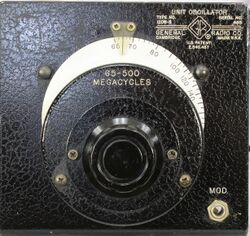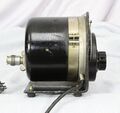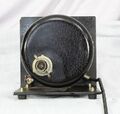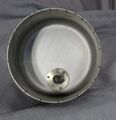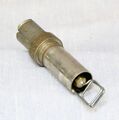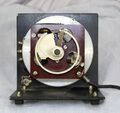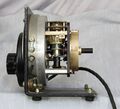1208-B
The General Radio 1208-B Unit Oscillator was introduced in Catalog O (1956) and remained available through Catalog Q (1961).
The Type 1208-B is a general-purpose frequency source covering 65 to 500 MHz. Its an updated version of the 1208-A, most of the improvements are mechanical. It finds use as a generator for bridges, admittance meters, and impedance meters. By the use of sliding contacts in the oscillator circuit, sweep must be limited duty and slow speeds. In combination with an 874-GA Attenuator, an 874-VR Voltmeter Rectifier, and an 874-VI Voltmeter Indicator it provides an accurately known output voltage for receiver testing.
Direct amplitude modulation at audio frequencies is introduced at a front panel jack. With a 1000-P6 Crystal Diode Modulator accessory, modulation from 0 to 20 MHz is possible that is essentially free of FM.
As a unit oscillator, the 1215-B requires an external power supply, type 1203-B is recommended.
Specifications
- Frequency Range: 65-500 MHz
- Frequency Calibration Accuracy: 2% at no load
- Warm-up Frequency Drift: 0.5%
- Output Power: 100 mW minimum, 300 mW at the center of range into a 50-ohm load
Links
- Experimenter October 1955 describing Updated Unit Oscillators
- GE 2C43 Lighthouse Triode Datasheet
- RCA 2C43 Lighthouse Triode Datasheet
